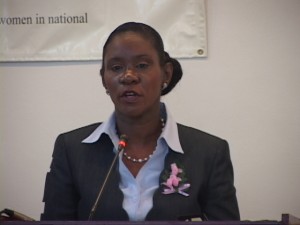– Webster announces plans for national conversations on domestic violence
By Michael Younge

Government is moving to convene national conversations on domestic violence following the recent upsurge in the social scourge which saw at least nine women losing their lives at the hands of abusive spouses and partners.
The talks will aim to come up with more solutions and new avenues through which government, the private sector, and non-governmental organisations can work towards eliminating or reducing the scourge.
Human Services Minister Jenifer Webster made the announcement during an interview with Guyana Times International on Monday afternoon at her office. Webster, who condemned all of the recent acts of domestic violence, said it is time once again for all the stakeholders to meet and discuss the problem, with the aim of taking more proactive approaches towards the abuse and violence perpetrated against women.
The launch of the talks is set for June 27 at the International Convention Centre, and will see representatives from the Human Services Ministry, non-governmental organisations, the religious community, ordinary Guyanese, political parties, and civil society converging to be part of a think-tank about what else can be done to fight the growing social ill.
Minister Webster said that “no man has the right to beat, abuse, or take the life of a woman”, arguing that many women find themselves with their backs against the wall because they believe they have no choices.
Webster said there are menus of options available to women who are in abusive relationships, as she explained that they must speak out, leave, and report instances so that action can be taken.
“Domestic violence is a major problem, and I believe that we have to start to address the issue through behavioural change campaigns… we have to start too with our young boys and girls so as to change the values and morals they have inherited that make them resort to violence or abuse,” Webster admitted.
She expressed disappointment that more and more women were becoming “statistics”, sometimes suffering unbelievable forms of abuse which often result in death.
Criticism
The human services minister shot down criticism that government has not been responding to the calls of abused women in a timely and appropriate manner as she disclosed several initiatives and programmes, which have been targeting the vulnerable group and perpetrators of the insidious act.
“In 2008, we launched the Stamp It Out campaign; in 2009, Breaking The Silence campaign; in 2010, you saw us making inroads with the launch of the Sexual Offences Act with more emphasis on rape and abuse; and in 2011, we continued our work in this respect,” she reiterated.
The minister said every day her ministry is offering counselling services and assistance to women who find themselves in abusive marriages, common-law unions and relationships. She admitted that her staff is critically involved, too, in providing the necessary sensitisation material and information for women to become empowered about their rights and responsibilities.
Webster issued a call for community policing groups, community leaders, and neighbours to become gatekeepers in the fight against domestic violence, urging them not to leave any instance unreported.
She said that while the legislation is in place, her ministry has long recognised the need for more administrative and institutional capacity building to take place.
“More needs to be done…we have done a lot, but we cannot lose sight of our ultimate target of emphasising the importance to respect our women folk… this battle is too critical to be lost at such a late hour and I will not lose focus… the perpetrators of every act must face the courts and must be brought to justice and made an example,” she stressed.
She also lauded the work of the Men’s Affairs Bureau (MAB), which has been working closely with males in society to assist them to understand their gender roles, and the need for them to resort to other forms of dispute and conflict resolution, apart from violence.
Domestic violence costing the state
The human services minister said “domestic abuse has a socio-economic cost”, which is placed on the shoulders of the state in most instances, as she referred to a host of cases where women are killed, the spouse or husband is remanded, and the children are left unsupervised and without any proper guidance and parental support.
“We have to provide for them in many cases and ensure that they receive the necessary care and support to lead healthy, happy lives,” she noted. “We continue to lose our valuable human resources when their lives are snuffed out by drunk partners, violent men, and jealous lovers… we cannot continue like this,” she emphasised.
She did not believe that those men who murdered women for frivolous reasons should be shown mercy, but must be held accountable to the law, while they benefit from the necessary rehabilitative services available behind bars and at mental institutions.
The Human Services Ministry has initiated a number of studies aimed at arriving at the drivers of domestic violence, understanding the male perspective, and looking at the far-reaching consequences of the scourge on human capital. She called on the police to continue to probe the matters before them in a timely manner, advising that her office remains ready to lend the necessary assistance.
The National Oversight Committee on Domestic Violence was reconvened a few weeks ago, and is earnestly working towards the completion of the regulations that would operationalise the Domestic Violence Act so it can take effect fully. “No victim must be denied access to justice, as I strongly believe that any crime committed against a woman is an abhorrent one that must be condemned by all,” she concluded.




Comments are closed.